MGMT601: Emotional Intelligence Factors and Leadership Report
VerifiedAdded on 2023/06/04
|9
|1976
|297
Report
AI Summary
This report examines the impact of emotional intelligence on leadership within organizations. It begins by defining emotional intelligence factors such as self-awareness, self-regulation, motivation, empathy, and social skills, and then explores how these factors relate to leadership effectiveness. The report discusses how self-awareness aids in identifying strengths and weaknesses, self-regulation influences interactions with other employees, and motivation enhances employee engagement. Empathy is highlighted as a key component in improving the work environment and lowering employee retention rates, while social skills contribute to improved networking and overall organizational development. The report further investigates methods for teaching emotional intelligence, emphasizing the importance of managing emotions and developing social skills. Finally, it provides insights on how to identify individuals with high emotional intelligence by observing their ability to manage emotions, understand their abilities, and respond empathetically to others. The report concludes that enhancing emotional intelligence among employees can significantly improve organizational performance, and management should take measures to foster its development.
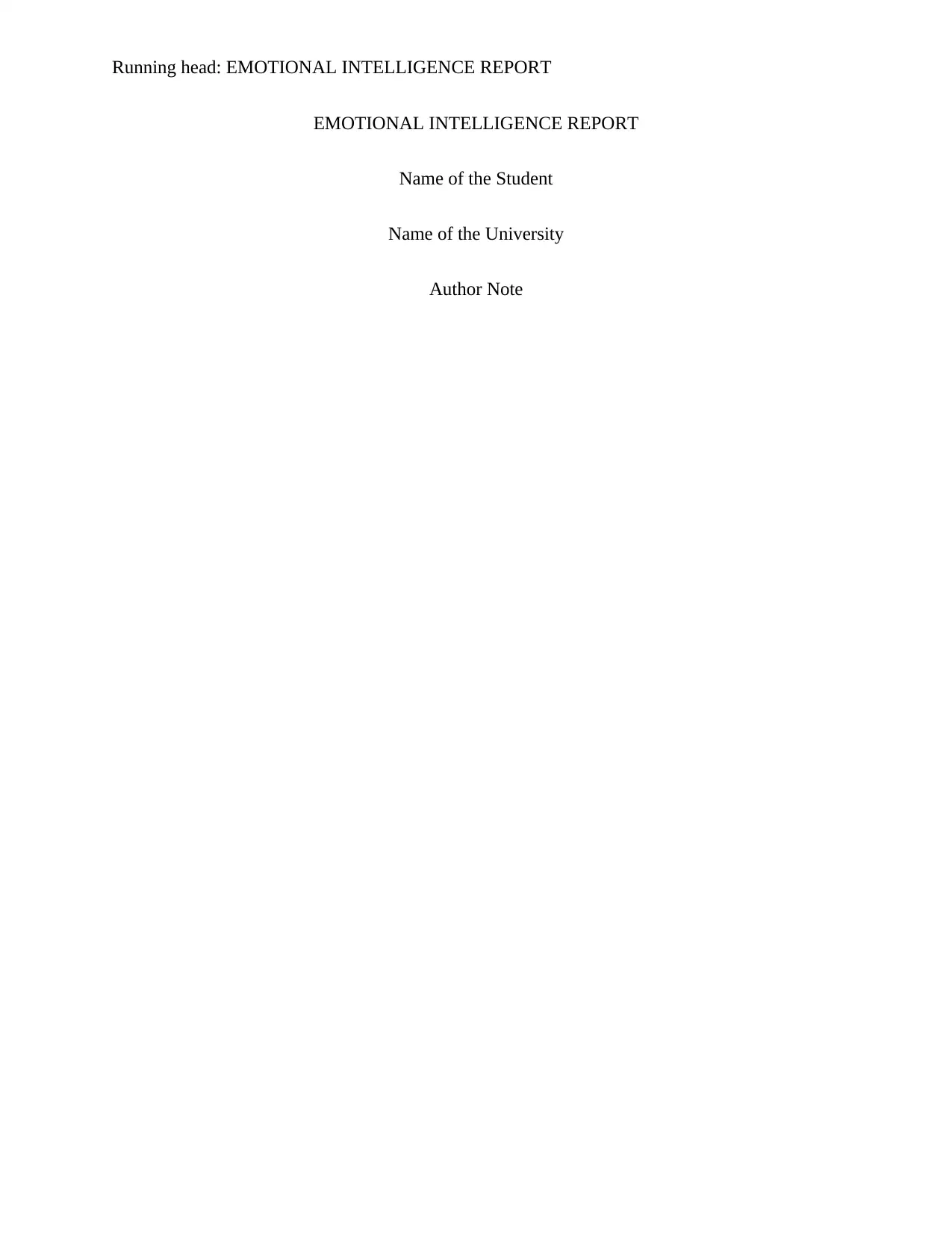
Running head: EMOTIONAL INTELLIGENCE REPORT
EMOTIONAL INTELLIGENCE REPORT
Name of the Student
Name of the University
Author Note
EMOTIONAL INTELLIGENCE REPORT
Name of the Student
Name of the University
Author Note
Paraphrase This Document
Need a fresh take? Get an instant paraphrase of this document with our AI Paraphraser
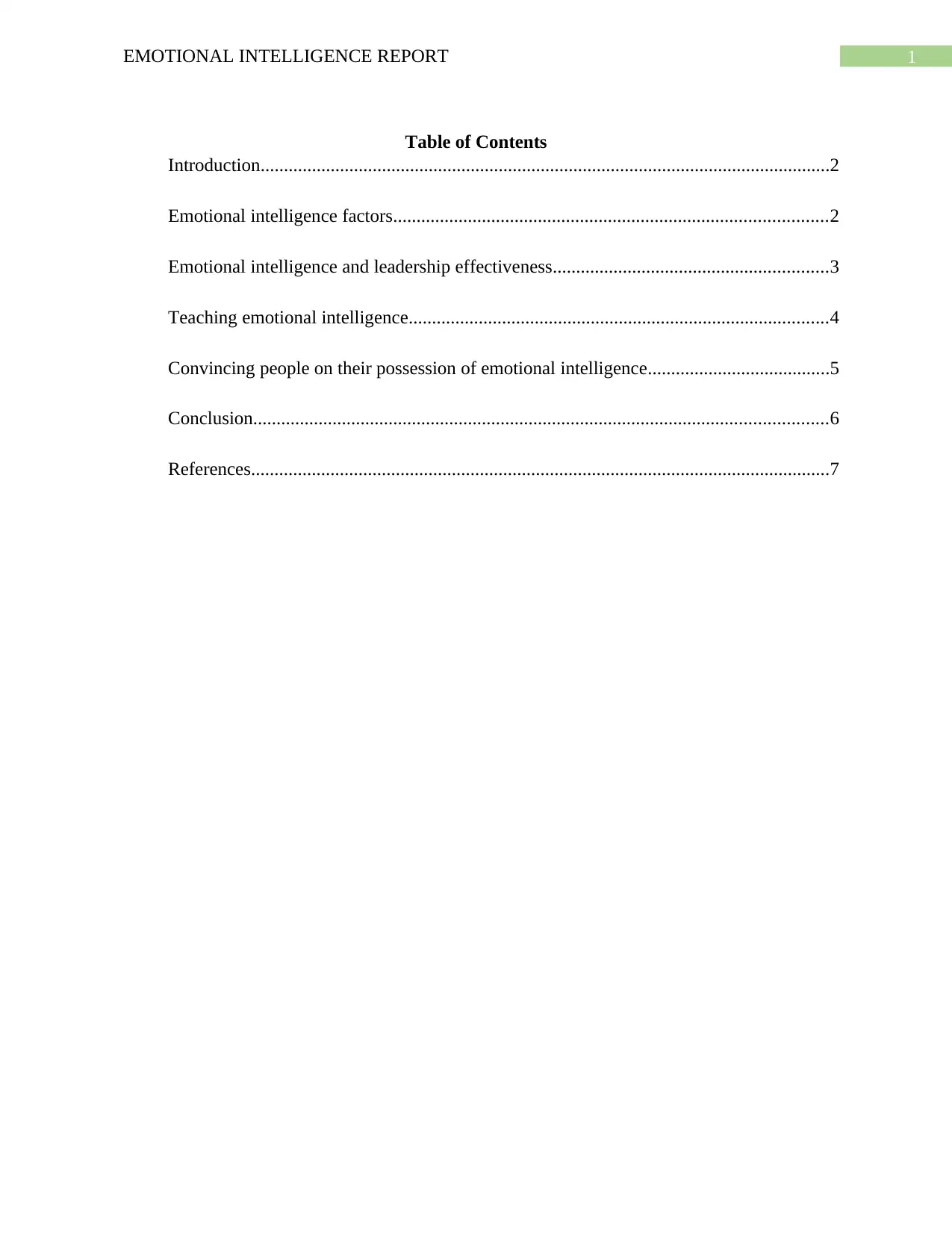
1EMOTIONAL INTELLIGENCE REPORT
Table of Contents
Introduction..........................................................................................................................2
Emotional intelligence factors.............................................................................................2
Emotional intelligence and leadership effectiveness...........................................................3
Teaching emotional intelligence..........................................................................................4
Convincing people on their possession of emotional intelligence.......................................5
Conclusion...........................................................................................................................6
References............................................................................................................................7
Table of Contents
Introduction..........................................................................................................................2
Emotional intelligence factors.............................................................................................2
Emotional intelligence and leadership effectiveness...........................................................3
Teaching emotional intelligence..........................................................................................4
Convincing people on their possession of emotional intelligence.......................................5
Conclusion...........................................................................................................................6
References............................................................................................................................7
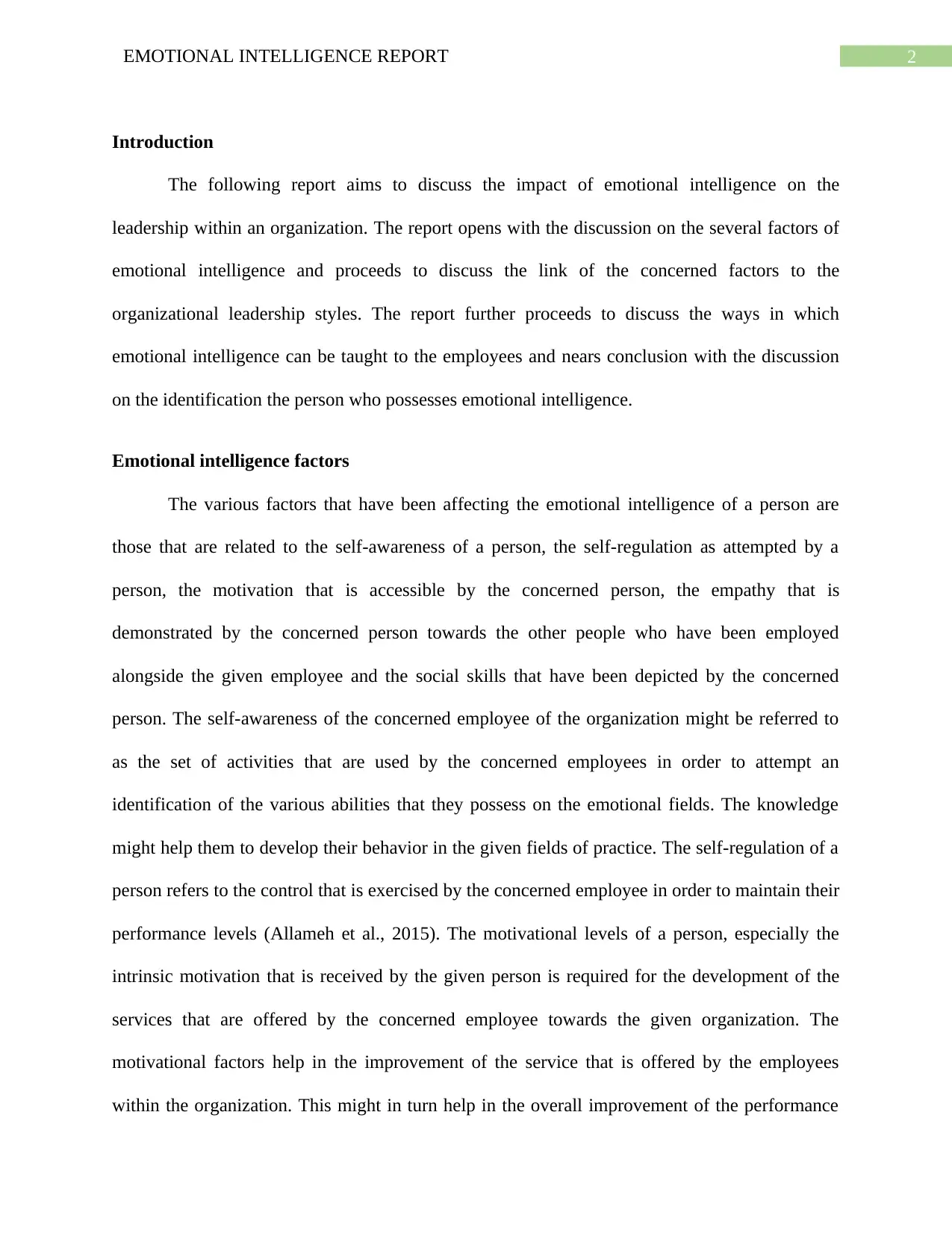
2EMOTIONAL INTELLIGENCE REPORT
Introduction
The following report aims to discuss the impact of emotional intelligence on the
leadership within an organization. The report opens with the discussion on the several factors of
emotional intelligence and proceeds to discuss the link of the concerned factors to the
organizational leadership styles. The report further proceeds to discuss the ways in which
emotional intelligence can be taught to the employees and nears conclusion with the discussion
on the identification the person who possesses emotional intelligence.
Emotional intelligence factors
The various factors that have been affecting the emotional intelligence of a person are
those that are related to the self-awareness of a person, the self-regulation as attempted by a
person, the motivation that is accessible by the concerned person, the empathy that is
demonstrated by the concerned person towards the other people who have been employed
alongside the given employee and the social skills that have been depicted by the concerned
person. The self-awareness of the concerned employee of the organization might be referred to
as the set of activities that are used by the concerned employees in order to attempt an
identification of the various abilities that they possess on the emotional fields. The knowledge
might help them to develop their behavior in the given fields of practice. The self-regulation of a
person refers to the control that is exercised by the concerned employee in order to maintain their
performance levels (Allameh et al., 2015). The motivational levels of a person, especially the
intrinsic motivation that is received by the given person is required for the development of the
services that are offered by the concerned employee towards the given organization. The
motivational factors help in the improvement of the service that is offered by the employees
within the organization. This might in turn help in the overall improvement of the performance
Introduction
The following report aims to discuss the impact of emotional intelligence on the
leadership within an organization. The report opens with the discussion on the several factors of
emotional intelligence and proceeds to discuss the link of the concerned factors to the
organizational leadership styles. The report further proceeds to discuss the ways in which
emotional intelligence can be taught to the employees and nears conclusion with the discussion
on the identification the person who possesses emotional intelligence.
Emotional intelligence factors
The various factors that have been affecting the emotional intelligence of a person are
those that are related to the self-awareness of a person, the self-regulation as attempted by a
person, the motivation that is accessible by the concerned person, the empathy that is
demonstrated by the concerned person towards the other people who have been employed
alongside the given employee and the social skills that have been depicted by the concerned
person. The self-awareness of the concerned employee of the organization might be referred to
as the set of activities that are used by the concerned employees in order to attempt an
identification of the various abilities that they possess on the emotional fields. The knowledge
might help them to develop their behavior in the given fields of practice. The self-regulation of a
person refers to the control that is exercised by the concerned employee in order to maintain their
performance levels (Allameh et al., 2015). The motivational levels of a person, especially the
intrinsic motivation that is received by the given person is required for the development of the
services that are offered by the concerned employee towards the given organization. The
motivational factors help in the improvement of the service that is offered by the employees
within the organization. This might in turn help in the overall improvement of the performance
⊘ This is a preview!⊘
Do you want full access?
Subscribe today to unlock all pages.

Trusted by 1+ million students worldwide
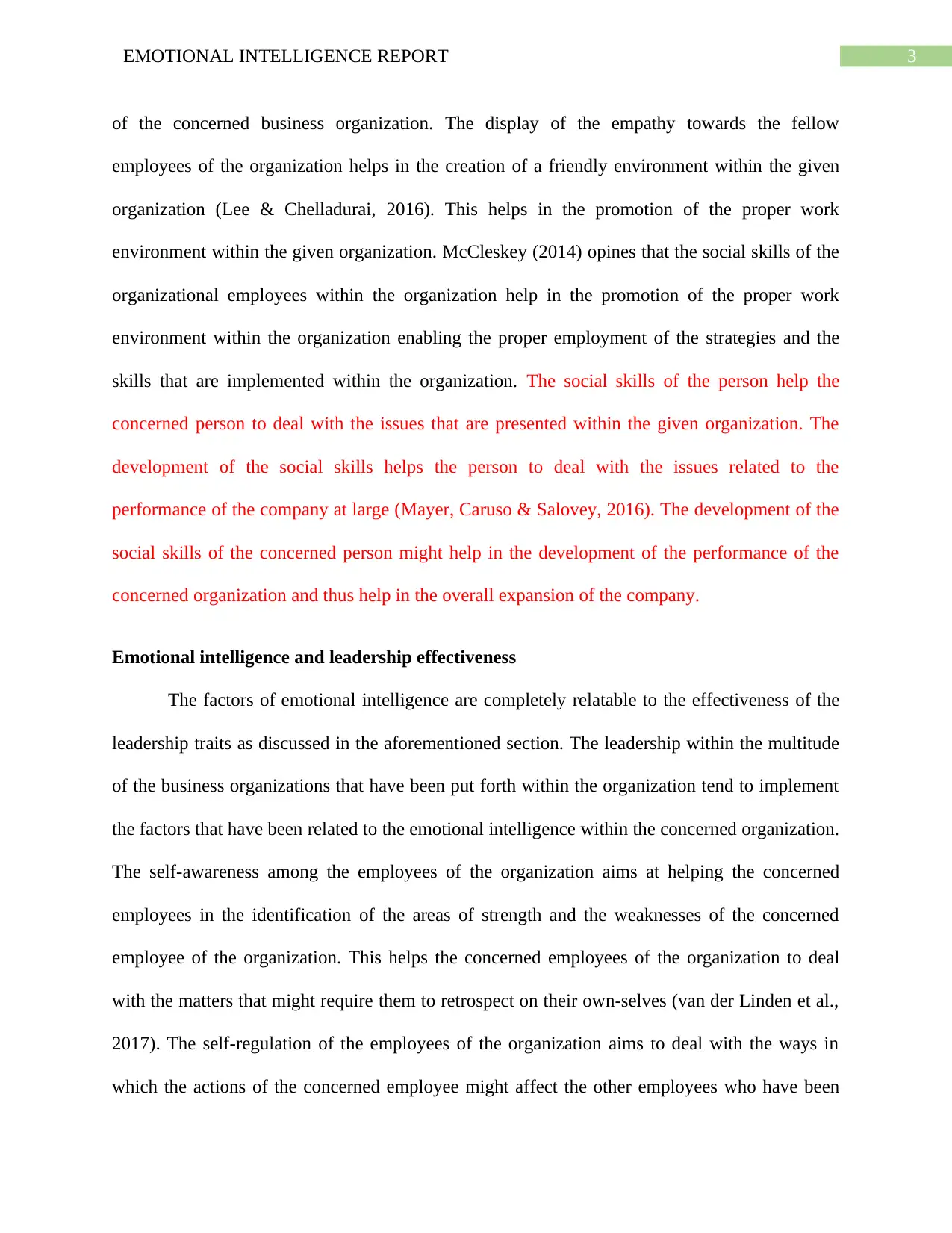
3EMOTIONAL INTELLIGENCE REPORT
of the concerned business organization. The display of the empathy towards the fellow
employees of the organization helps in the creation of a friendly environment within the given
organization (Lee & Chelladurai, 2016). This helps in the promotion of the proper work
environment within the given organization. McCleskey (2014) opines that the social skills of the
organizational employees within the organization help in the promotion of the proper work
environment within the organization enabling the proper employment of the strategies and the
skills that are implemented within the organization. The social skills of the person help the
concerned person to deal with the issues that are presented within the given organization. The
development of the social skills helps the person to deal with the issues related to the
performance of the company at large (Mayer, Caruso & Salovey, 2016). The development of the
social skills of the concerned person might help in the development of the performance of the
concerned organization and thus help in the overall expansion of the company.
Emotional intelligence and leadership effectiveness
The factors of emotional intelligence are completely relatable to the effectiveness of the
leadership traits as discussed in the aforementioned section. The leadership within the multitude
of the business organizations that have been put forth within the organization tend to implement
the factors that have been related to the emotional intelligence within the concerned organization.
The self-awareness among the employees of the organization aims at helping the concerned
employees in the identification of the areas of strength and the weaknesses of the concerned
employee of the organization. This helps the concerned employees of the organization to deal
with the matters that might require them to retrospect on their own-selves (van der Linden et al.,
2017). The self-regulation of the employees of the organization aims to deal with the ways in
which the actions of the concerned employee might affect the other employees who have been
of the concerned business organization. The display of the empathy towards the fellow
employees of the organization helps in the creation of a friendly environment within the given
organization (Lee & Chelladurai, 2016). This helps in the promotion of the proper work
environment within the given organization. McCleskey (2014) opines that the social skills of the
organizational employees within the organization help in the promotion of the proper work
environment within the organization enabling the proper employment of the strategies and the
skills that are implemented within the organization. The social skills of the person help the
concerned person to deal with the issues that are presented within the given organization. The
development of the social skills helps the person to deal with the issues related to the
performance of the company at large (Mayer, Caruso & Salovey, 2016). The development of the
social skills of the concerned person might help in the development of the performance of the
concerned organization and thus help in the overall expansion of the company.
Emotional intelligence and leadership effectiveness
The factors of emotional intelligence are completely relatable to the effectiveness of the
leadership traits as discussed in the aforementioned section. The leadership within the multitude
of the business organizations that have been put forth within the organization tend to implement
the factors that have been related to the emotional intelligence within the concerned organization.
The self-awareness among the employees of the organization aims at helping the concerned
employees in the identification of the areas of strength and the weaknesses of the concerned
employee of the organization. This helps the concerned employees of the organization to deal
with the matters that might require them to retrospect on their own-selves (van der Linden et al.,
2017). The self-regulation of the employees of the organization aims to deal with the ways in
which the actions of the concerned employee might affect the other employees who have been
Paraphrase This Document
Need a fresh take? Get an instant paraphrase of this document with our AI Paraphraser
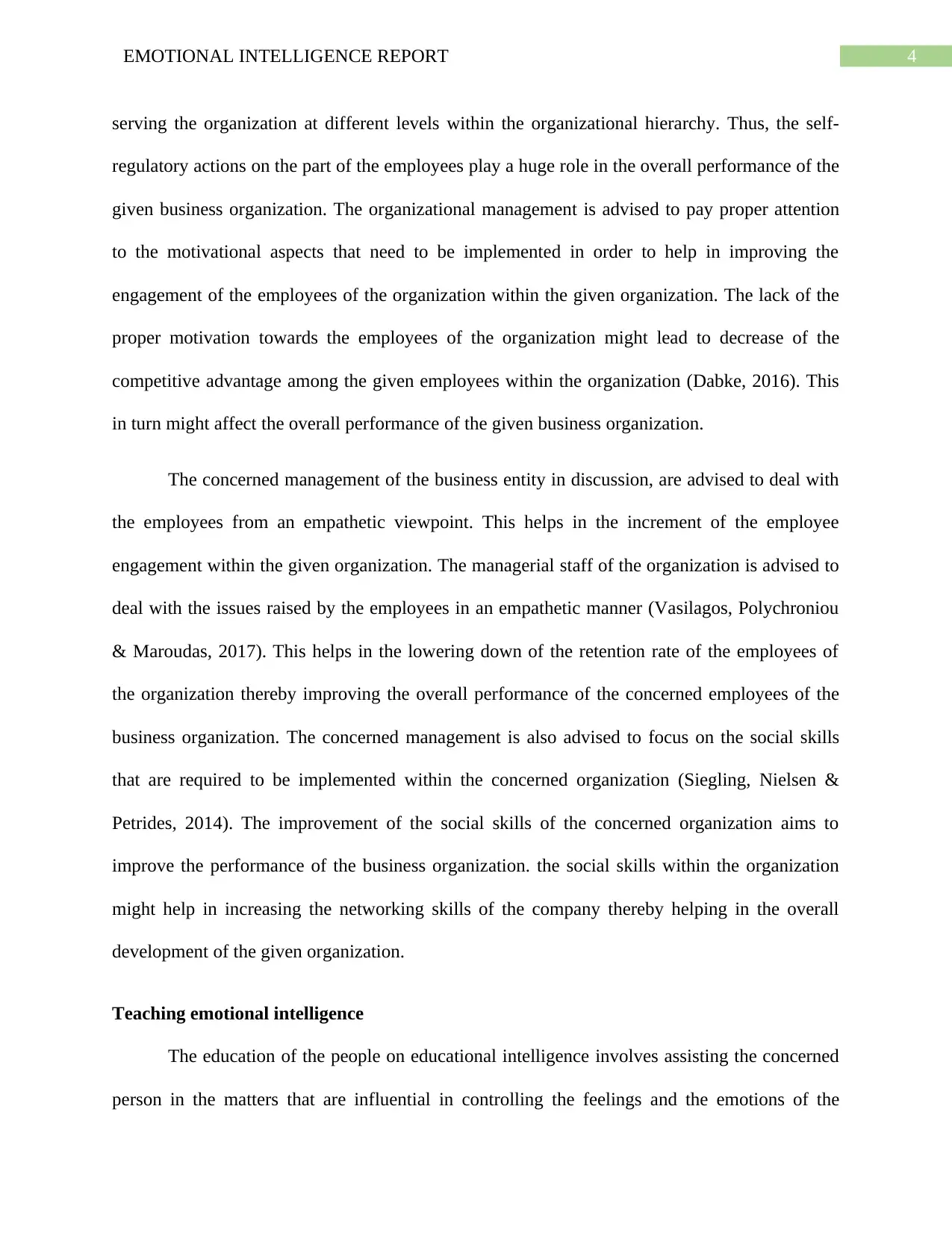
4EMOTIONAL INTELLIGENCE REPORT
serving the organization at different levels within the organizational hierarchy. Thus, the self-
regulatory actions on the part of the employees play a huge role in the overall performance of the
given business organization. The organizational management is advised to pay proper attention
to the motivational aspects that need to be implemented in order to help in improving the
engagement of the employees of the organization within the given organization. The lack of the
proper motivation towards the employees of the organization might lead to decrease of the
competitive advantage among the given employees within the organization (Dabke, 2016). This
in turn might affect the overall performance of the given business organization.
The concerned management of the business entity in discussion, are advised to deal with
the employees from an empathetic viewpoint. This helps in the increment of the employee
engagement within the given organization. The managerial staff of the organization is advised to
deal with the issues raised by the employees in an empathetic manner (Vasilagos, Polychroniou
& Maroudas, 2017). This helps in the lowering down of the retention rate of the employees of
the organization thereby improving the overall performance of the concerned employees of the
business organization. The concerned management is also advised to focus on the social skills
that are required to be implemented within the concerned organization (Siegling, Nielsen &
Petrides, 2014). The improvement of the social skills of the concerned organization aims to
improve the performance of the business organization. the social skills within the organization
might help in increasing the networking skills of the company thereby helping in the overall
development of the given organization.
Teaching emotional intelligence
The education of the people on educational intelligence involves assisting the concerned
person in the matters that are influential in controlling the feelings and the emotions of the
serving the organization at different levels within the organizational hierarchy. Thus, the self-
regulatory actions on the part of the employees play a huge role in the overall performance of the
given business organization. The organizational management is advised to pay proper attention
to the motivational aspects that need to be implemented in order to help in improving the
engagement of the employees of the organization within the given organization. The lack of the
proper motivation towards the employees of the organization might lead to decrease of the
competitive advantage among the given employees within the organization (Dabke, 2016). This
in turn might affect the overall performance of the given business organization.
The concerned management of the business entity in discussion, are advised to deal with
the employees from an empathetic viewpoint. This helps in the increment of the employee
engagement within the given organization. The managerial staff of the organization is advised to
deal with the issues raised by the employees in an empathetic manner (Vasilagos, Polychroniou
& Maroudas, 2017). This helps in the lowering down of the retention rate of the employees of
the organization thereby improving the overall performance of the concerned employees of the
business organization. The concerned management is also advised to focus on the social skills
that are required to be implemented within the concerned organization (Siegling, Nielsen &
Petrides, 2014). The improvement of the social skills of the concerned organization aims to
improve the performance of the business organization. the social skills within the organization
might help in increasing the networking skills of the company thereby helping in the overall
development of the given organization.
Teaching emotional intelligence
The education of the people on educational intelligence involves assisting the concerned
person in the matters that are influential in controlling the feelings and the emotions of the
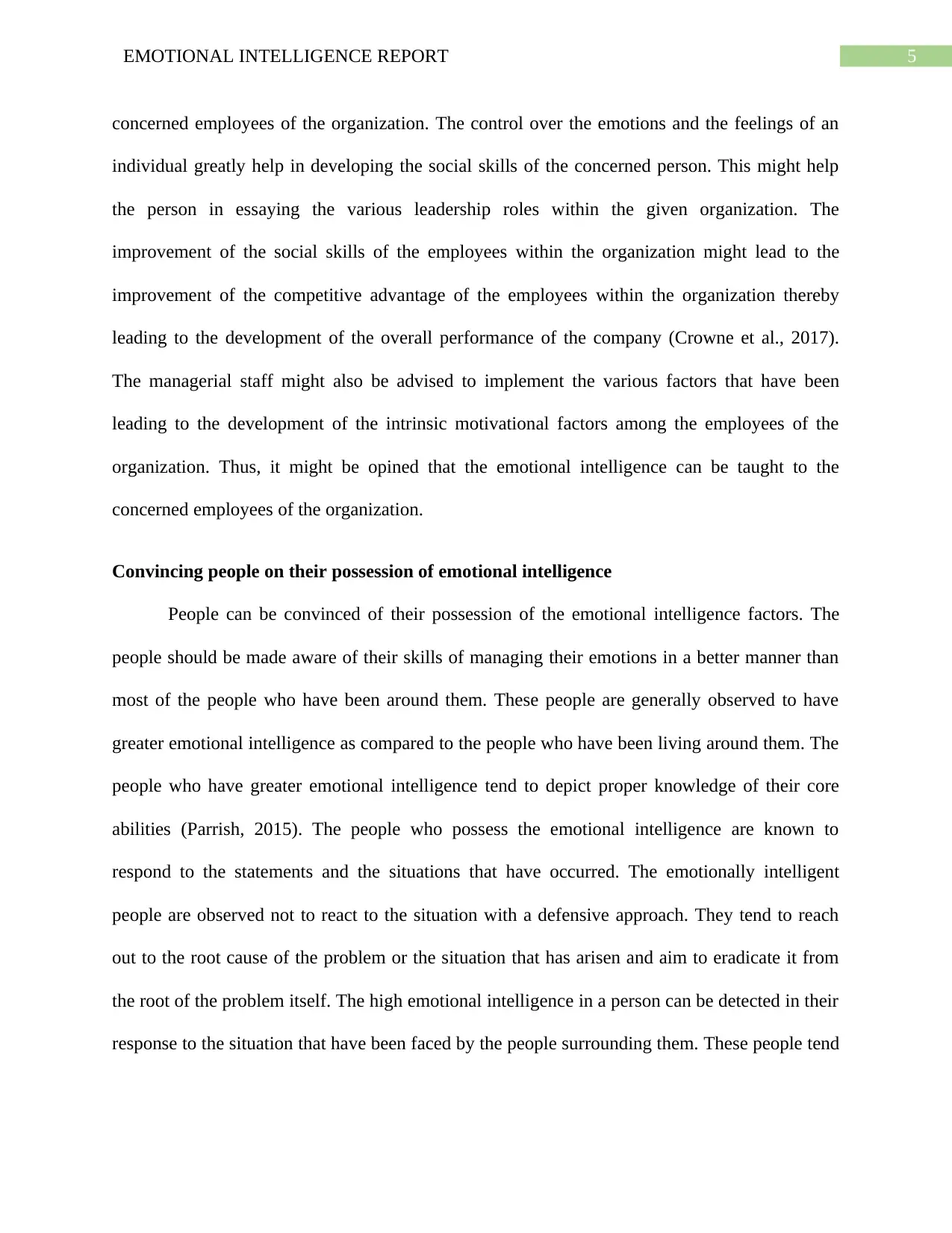
5EMOTIONAL INTELLIGENCE REPORT
concerned employees of the organization. The control over the emotions and the feelings of an
individual greatly help in developing the social skills of the concerned person. This might help
the person in essaying the various leadership roles within the given organization. The
improvement of the social skills of the employees within the organization might lead to the
improvement of the competitive advantage of the employees within the organization thereby
leading to the development of the overall performance of the company (Crowne et al., 2017).
The managerial staff might also be advised to implement the various factors that have been
leading to the development of the intrinsic motivational factors among the employees of the
organization. Thus, it might be opined that the emotional intelligence can be taught to the
concerned employees of the organization.
Convincing people on their possession of emotional intelligence
People can be convinced of their possession of the emotional intelligence factors. The
people should be made aware of their skills of managing their emotions in a better manner than
most of the people who have been around them. These people are generally observed to have
greater emotional intelligence as compared to the people who have been living around them. The
people who have greater emotional intelligence tend to depict proper knowledge of their core
abilities (Parrish, 2015). The people who possess the emotional intelligence are known to
respond to the statements and the situations that have occurred. The emotionally intelligent
people are observed not to react to the situation with a defensive approach. They tend to reach
out to the root cause of the problem or the situation that has arisen and aim to eradicate it from
the root of the problem itself. The high emotional intelligence in a person can be detected in their
response to the situation that have been faced by the people surrounding them. These people tend
concerned employees of the organization. The control over the emotions and the feelings of an
individual greatly help in developing the social skills of the concerned person. This might help
the person in essaying the various leadership roles within the given organization. The
improvement of the social skills of the employees within the organization might lead to the
improvement of the competitive advantage of the employees within the organization thereby
leading to the development of the overall performance of the company (Crowne et al., 2017).
The managerial staff might also be advised to implement the various factors that have been
leading to the development of the intrinsic motivational factors among the employees of the
organization. Thus, it might be opined that the emotional intelligence can be taught to the
concerned employees of the organization.
Convincing people on their possession of emotional intelligence
People can be convinced of their possession of the emotional intelligence factors. The
people should be made aware of their skills of managing their emotions in a better manner than
most of the people who have been around them. These people are generally observed to have
greater emotional intelligence as compared to the people who have been living around them. The
people who have greater emotional intelligence tend to depict proper knowledge of their core
abilities (Parrish, 2015). The people who possess the emotional intelligence are known to
respond to the statements and the situations that have occurred. The emotionally intelligent
people are observed not to react to the situation with a defensive approach. They tend to reach
out to the root cause of the problem or the situation that has arisen and aim to eradicate it from
the root of the problem itself. The high emotional intelligence in a person can be detected in their
response to the situation that have been faced by the people surrounding them. These people tend
⊘ This is a preview!⊘
Do you want full access?
Subscribe today to unlock all pages.

Trusted by 1+ million students worldwide
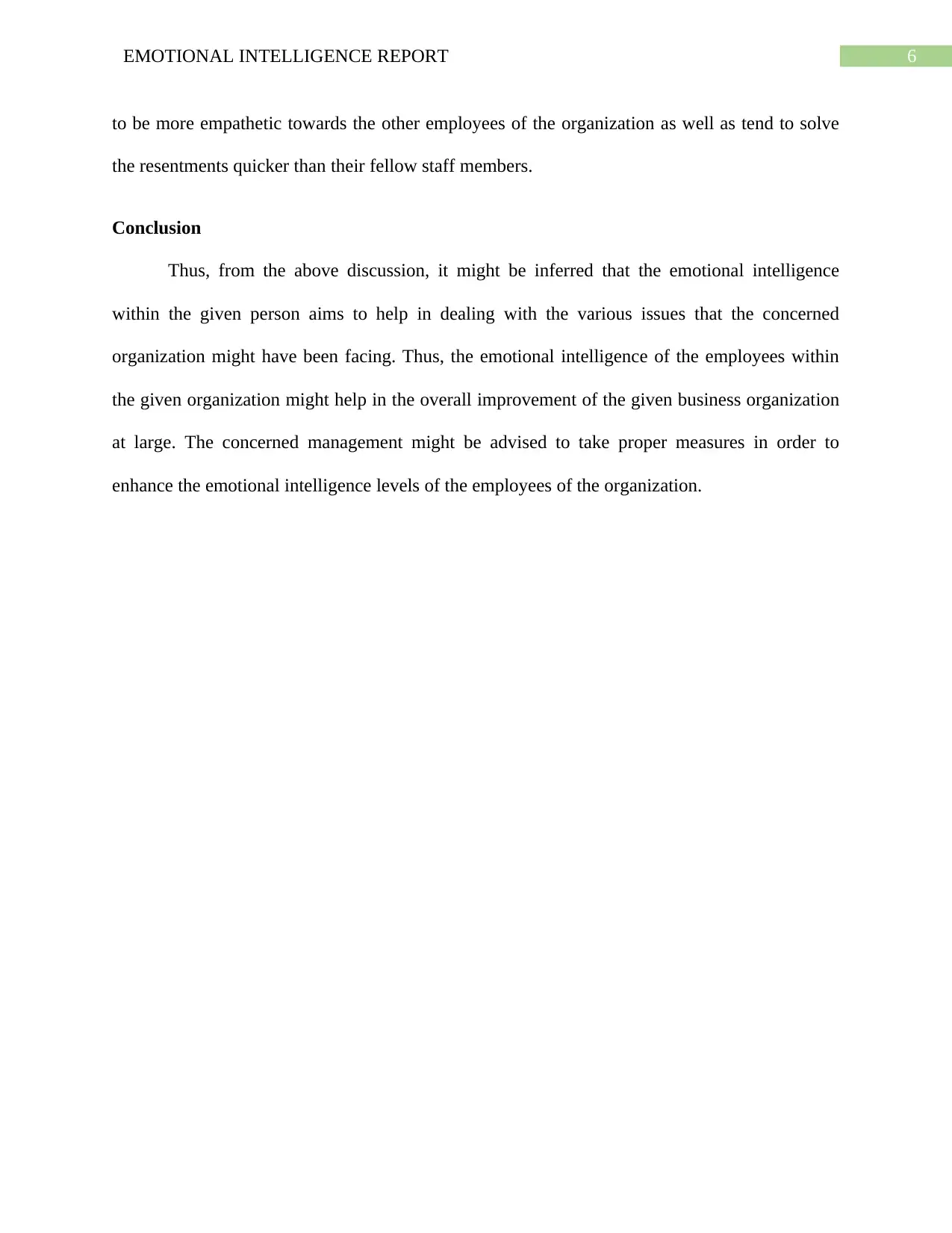
6EMOTIONAL INTELLIGENCE REPORT
to be more empathetic towards the other employees of the organization as well as tend to solve
the resentments quicker than their fellow staff members.
Conclusion
Thus, from the above discussion, it might be inferred that the emotional intelligence
within the given person aims to help in dealing with the various issues that the concerned
organization might have been facing. Thus, the emotional intelligence of the employees within
the given organization might help in the overall improvement of the given business organization
at large. The concerned management might be advised to take proper measures in order to
enhance the emotional intelligence levels of the employees of the organization.
to be more empathetic towards the other employees of the organization as well as tend to solve
the resentments quicker than their fellow staff members.
Conclusion
Thus, from the above discussion, it might be inferred that the emotional intelligence
within the given person aims to help in dealing with the various issues that the concerned
organization might have been facing. Thus, the emotional intelligence of the employees within
the given organization might help in the overall improvement of the given business organization
at large. The concerned management might be advised to take proper measures in order to
enhance the emotional intelligence levels of the employees of the organization.
Paraphrase This Document
Need a fresh take? Get an instant paraphrase of this document with our AI Paraphraser
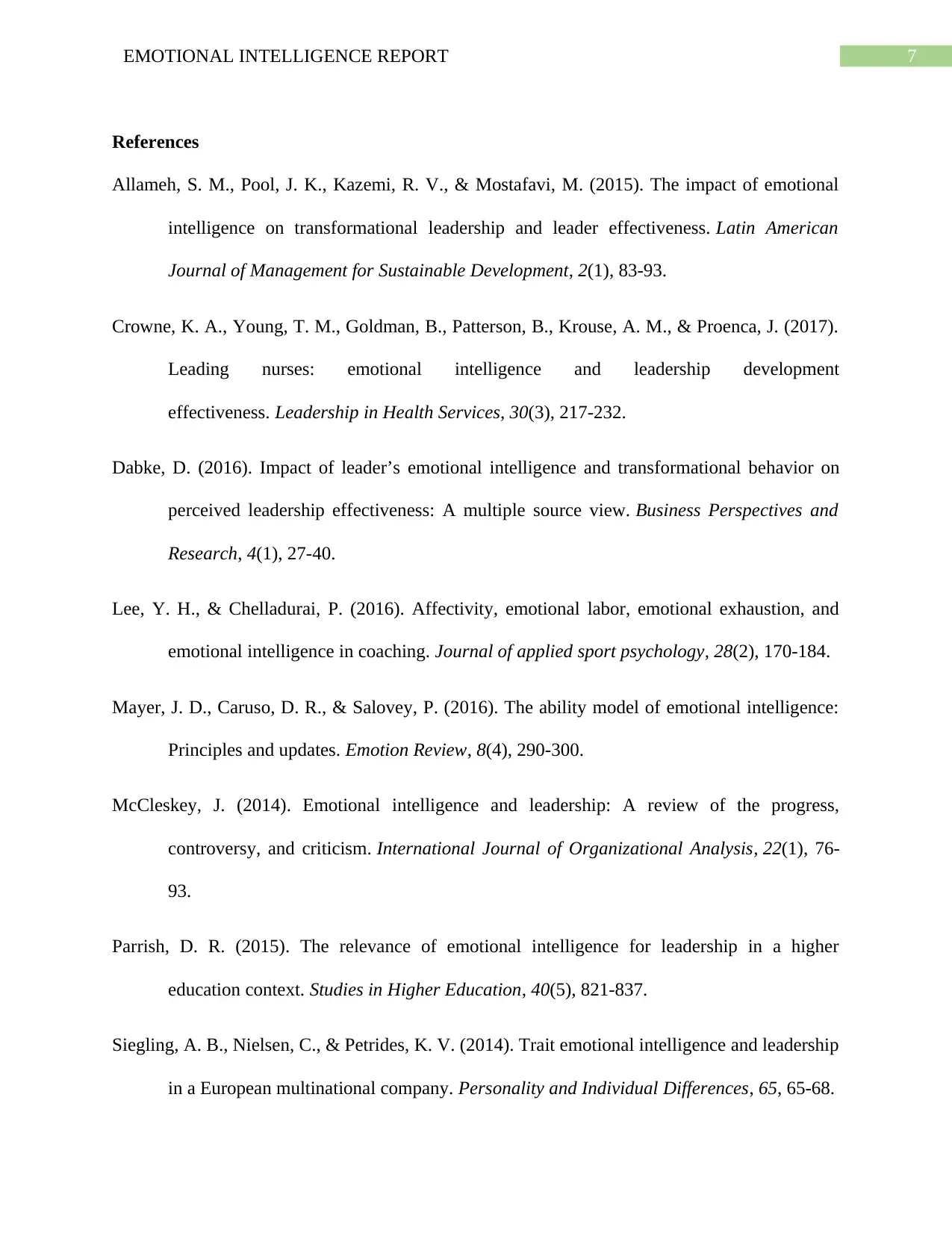
7EMOTIONAL INTELLIGENCE REPORT
References
Allameh, S. M., Pool, J. K., Kazemi, R. V., & Mostafavi, M. (2015). The impact of emotional
intelligence on transformational leadership and leader effectiveness. Latin American
Journal of Management for Sustainable Development, 2(1), 83-93.
Crowne, K. A., Young, T. M., Goldman, B., Patterson, B., Krouse, A. M., & Proenca, J. (2017).
Leading nurses: emotional intelligence and leadership development
effectiveness. Leadership in Health Services, 30(3), 217-232.
Dabke, D. (2016). Impact of leader’s emotional intelligence and transformational behavior on
perceived leadership effectiveness: A multiple source view. Business Perspectives and
Research, 4(1), 27-40.
Lee, Y. H., & Chelladurai, P. (2016). Affectivity, emotional labor, emotional exhaustion, and
emotional intelligence in coaching. Journal of applied sport psychology, 28(2), 170-184.
Mayer, J. D., Caruso, D. R., & Salovey, P. (2016). The ability model of emotional intelligence:
Principles and updates. Emotion Review, 8(4), 290-300.
McCleskey, J. (2014). Emotional intelligence and leadership: A review of the progress,
controversy, and criticism. International Journal of Organizational Analysis, 22(1), 76-
93.
Parrish, D. R. (2015). The relevance of emotional intelligence for leadership in a higher
education context. Studies in Higher Education, 40(5), 821-837.
Siegling, A. B., Nielsen, C., & Petrides, K. V. (2014). Trait emotional intelligence and leadership
in a European multinational company. Personality and Individual Differences, 65, 65-68.
References
Allameh, S. M., Pool, J. K., Kazemi, R. V., & Mostafavi, M. (2015). The impact of emotional
intelligence on transformational leadership and leader effectiveness. Latin American
Journal of Management for Sustainable Development, 2(1), 83-93.
Crowne, K. A., Young, T. M., Goldman, B., Patterson, B., Krouse, A. M., & Proenca, J. (2017).
Leading nurses: emotional intelligence and leadership development
effectiveness. Leadership in Health Services, 30(3), 217-232.
Dabke, D. (2016). Impact of leader’s emotional intelligence and transformational behavior on
perceived leadership effectiveness: A multiple source view. Business Perspectives and
Research, 4(1), 27-40.
Lee, Y. H., & Chelladurai, P. (2016). Affectivity, emotional labor, emotional exhaustion, and
emotional intelligence in coaching. Journal of applied sport psychology, 28(2), 170-184.
Mayer, J. D., Caruso, D. R., & Salovey, P. (2016). The ability model of emotional intelligence:
Principles and updates. Emotion Review, 8(4), 290-300.
McCleskey, J. (2014). Emotional intelligence and leadership: A review of the progress,
controversy, and criticism. International Journal of Organizational Analysis, 22(1), 76-
93.
Parrish, D. R. (2015). The relevance of emotional intelligence for leadership in a higher
education context. Studies in Higher Education, 40(5), 821-837.
Siegling, A. B., Nielsen, C., & Petrides, K. V. (2014). Trait emotional intelligence and leadership
in a European multinational company. Personality and Individual Differences, 65, 65-68.
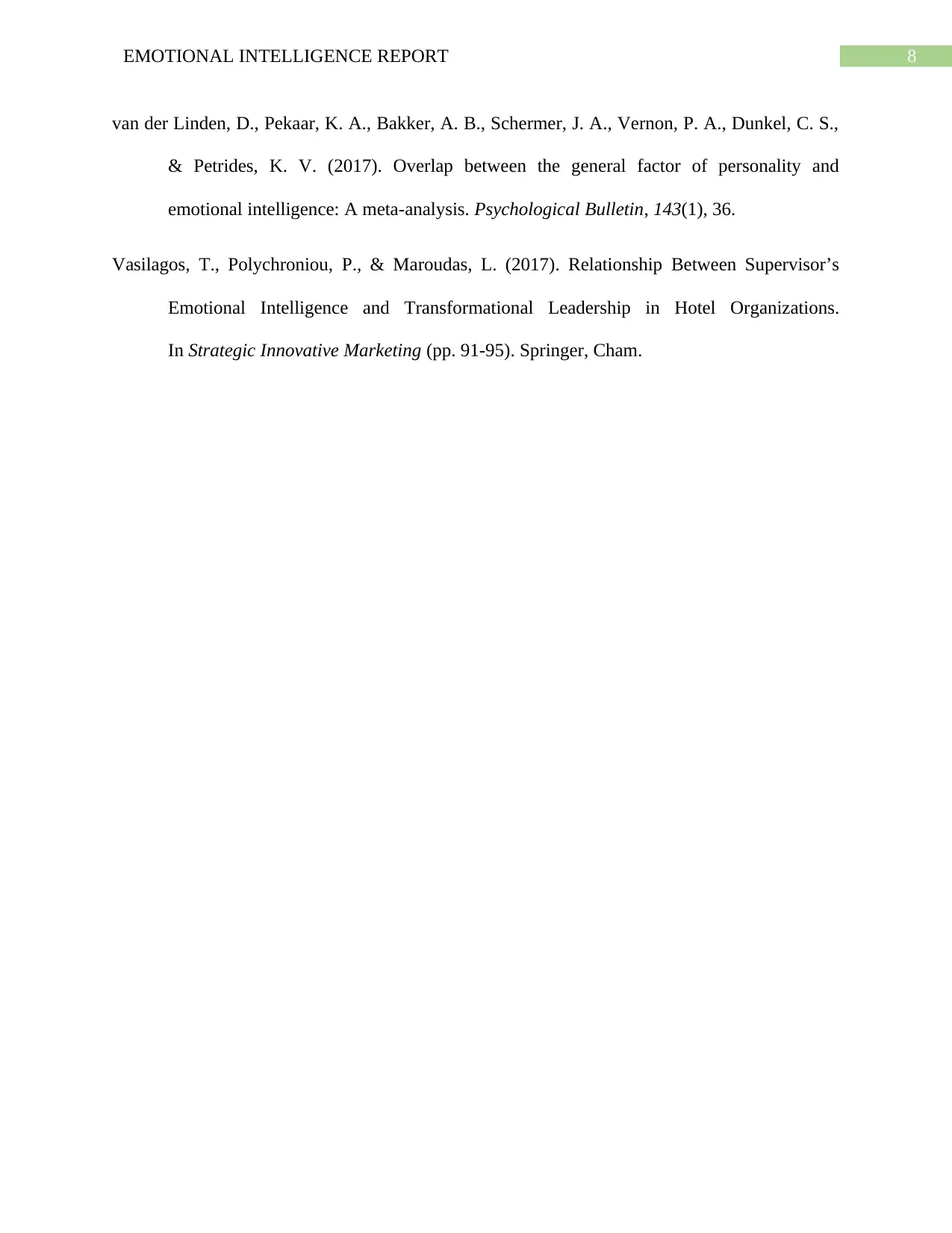
8EMOTIONAL INTELLIGENCE REPORT
van der Linden, D., Pekaar, K. A., Bakker, A. B., Schermer, J. A., Vernon, P. A., Dunkel, C. S.,
& Petrides, K. V. (2017). Overlap between the general factor of personality and
emotional intelligence: A meta-analysis. Psychological Bulletin, 143(1), 36.
Vasilagos, T., Polychroniou, P., & Maroudas, L. (2017). Relationship Between Supervisor’s
Emotional Intelligence and Transformational Leadership in Hotel Organizations.
In Strategic Innovative Marketing (pp. 91-95). Springer, Cham.
van der Linden, D., Pekaar, K. A., Bakker, A. B., Schermer, J. A., Vernon, P. A., Dunkel, C. S.,
& Petrides, K. V. (2017). Overlap between the general factor of personality and
emotional intelligence: A meta-analysis. Psychological Bulletin, 143(1), 36.
Vasilagos, T., Polychroniou, P., & Maroudas, L. (2017). Relationship Between Supervisor’s
Emotional Intelligence and Transformational Leadership in Hotel Organizations.
In Strategic Innovative Marketing (pp. 91-95). Springer, Cham.
⊘ This is a preview!⊘
Do you want full access?
Subscribe today to unlock all pages.

Trusted by 1+ million students worldwide
1 out of 9
Related Documents
Your All-in-One AI-Powered Toolkit for Academic Success.
+13062052269
info@desklib.com
Available 24*7 on WhatsApp / Email
![[object Object]](/_next/static/media/star-bottom.7253800d.svg)
Unlock your academic potential
Copyright © 2020–2025 A2Z Services. All Rights Reserved. Developed and managed by ZUCOL.





